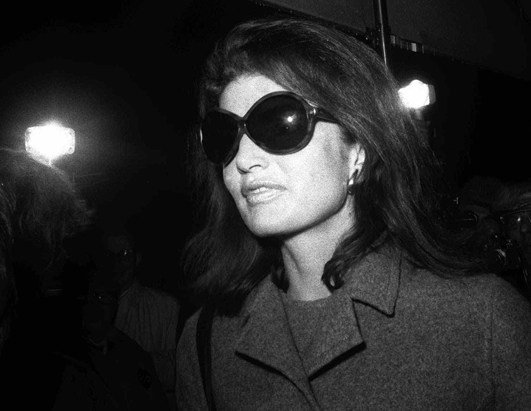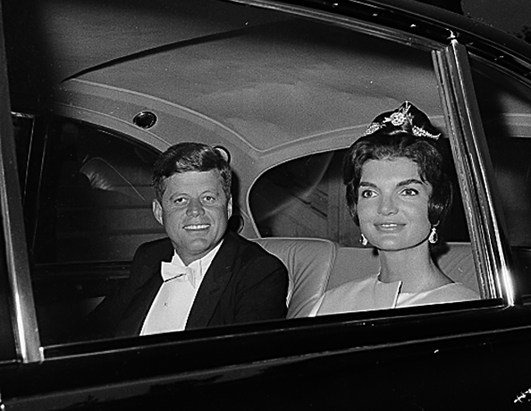Jacqueline Kennedy’s voice on the tapes released yesterday is breathy and girlish, often using childishly simple vocabulary, but the sentiments expressed are withering.
Recorded in 1964 and released yesterday by her daughter Caroline, Jacqueline Kennedy’s intimate recollections were confided to historian and former White House aide Arthur M. Schlesinger. ABC News airs the eight-hour tapes in series starting with September 13.
The transcripts of the released tapes are published in a book form – “Jacqueline Kennedy: Historic Conversations on Life With John. F. Kennedy”, which is launched today, September 14.

Jacqueline Kennedy was speaking just months after her husband President John F. Kennedy was gunned down in Dallas in November 1963. The former First Lady aim was to provide insider material for historians on the condition that the tapes would not be released for half a century. Her daughter, Caroline Kennedy has brought that release forward to commemorate the 50th anniversary of her father’s election as president.
The former First Lady talked about her disgust towards Martin Luther King after claimed he tried to arrange a sex party while in Washington for a march.
Jacqueline Kennedy’s relationship with Dr. Martin Luther King became strained as a result of wire taps arranged by FBI director J. Edgar Hoover.
This information had been passed to her by brother-in-law Bobby Kennedy, who as attorney-general authorized the bugging.
“He told me of a tape the FBI had of Martin Luther King when he was here for the freedom march. And he said this with no bitterness or anything, how he was calling up all these girls and arranging for a party of men and women, I mean, sort of an orgy in the hotel, and everything.”
Jacqueline Kennedy says Bobby also told her that Martin Luther King made derogatory comments about Kennedy’s funeral, apparently at the expense of the Archbishop of Boston, who gave the eulogy.
“He made fun of Cardinal Cushing and said that he was drunk at it,” Jacqueline Kennedy says.
“And things about they almost dropped the coffin and – well, I mean Martin Luther King is really a tricky person.”
This is not the first time that Martin Luther King, a Baptist minister and father-of-four with his wife Cor¬etta, has been accused of leading a rampant extra-marital sex life.
It has long been known that J Edgar Hoover, the FBI chief who ran the bureau as his personal fiefdom, detested him. An FBI memo called King “the most dangerous and effective Negro leader in the country”, and Hoover kept him under constant surveillance to try to prove he was a crypto-communist.
Hoover failed to do so but the wire tapping did provide salacious details of Martin Luther King’s sex life which former FBI chief set about using to discredit him. The tapes and transcripts were passed to JFK’s successor as president Lyndon B. Johnson who told one assistant:
“God dammit, if only you could hear what that hypocritical preacher does sexually.”
According to another assistant, the transcripts were as graphic as “an erotic book” and the tapes captured the noise of bedsprings.
There is an obvious irony about Jacqueline Kennedy’s remarks given what is well known about JFK’s infidelities.
But her daughter Caroline is anxious to put the tapes in the context of her mourning and Hoover’s determination to discredit Martin Luther King.
“Obviously J Edgar Hoover had passed on something that Martin Luther King said about my father’s funeral to uncle Bobby and to mummy. And obviously she was upset about that,” Caroline Kennedy told ABC News this weekend.
“It shows you the poisonous activities of J Edgar Hoover and the idea that this is going on at the highest levels of government is really twisted. If you asked her what she thought of Martin Luther King overall – I mean she admired him tremendously.”
Jacqueline Kennedy also shares her thoughts on the tapes about Charles de Gaulle whom the Kennedys met during a state visit to France in 1961. The occasion led John F. Kennedy to joke that he was “the man who accompanied Jacqueline Kennedy to Paris”.

Charles de Gaulle claimed after JFK’s death that Jackie Kennedy was “bound to end up on the yacht of an arms dealer”. For that, she brands the French president “spiteful” as well as an “egomaniac”.
Jacqueline Kennedy also tells she met Indian Prime Minister Indira Gandhi when the latter visited Washington in 1961 and a year later in New Delhi. The former First Lady des¬cribes Indira Ghandi as “a real prune – bitter, kind of pushy, horrible woman”.
Jackie Kennedy freely shares her husband’s derogatory attitude to Lyndon B. Johnson, his vice-president, whom he had only selected as a running mate to remove him from his powerful post in the Senate where his “enormous ego” would have led him to block Kennedy’s law-making agenda.
“Everyone was even amazed that he accepted,” she says.
JFK’s fear was that Lyndon Johnson would succeed him as president after his second term ended in 1968.
“Bobby told me this later and I know Jack said it to me sometimes. He said, <<Oh God, can you ever imagine what would happen to the country if Lyndon was president?>>. He didn’t like that idea that Lyndon would go on and be president because he was worried for the country.”
Jackie also refers to Johnson’s wife Lady Bird as a “trained hunting dog” because she followed her husband around, making notes of his conversations.
“She had every name and phone number – it was a funny kind of way of operating.”
Again Caroline Kennedy insists these were not her mother’s true feelings.
“It’s funny because she was really fond of Lyndon Johnson and really loved Lady Bird and always stayed in touch with her and they would visit.
“The description of Lyndon Johnson here is more of his capabilities as a president, more negative than she certainly felt about him as a person. I think she really appreciated the efforts that he made for her, when she was leaving the White House, and towards me and [my brother] John and she found him really amusing and warm hearted. And I think that it’s interesting because she’s able to separate those human qualities from some of his shortcomings as president.
“I also think that there’s stuff going on – again, this is a moment in time – between him and uncle Bobby. That is probably colouring her opinion here.”
Despite the former First Lady reported extra- marital relationships with married Bobby Kennedy and the unhappiness of her later marriage to tycoon Aristotle Onassis, the public image of Jacqueline Kennedy has always been that of the grieving widow who watched the handsome husband who became America’s youngest president gunned down alongside her.
